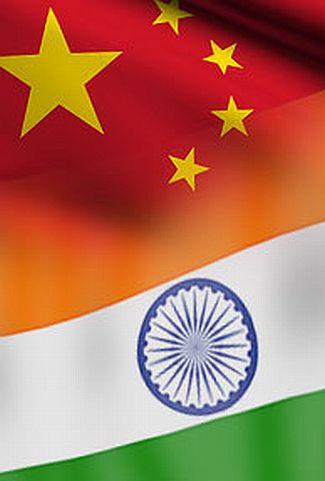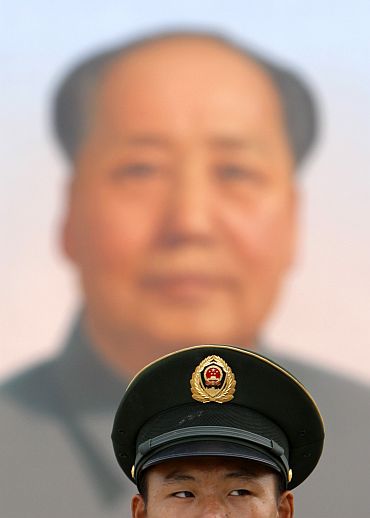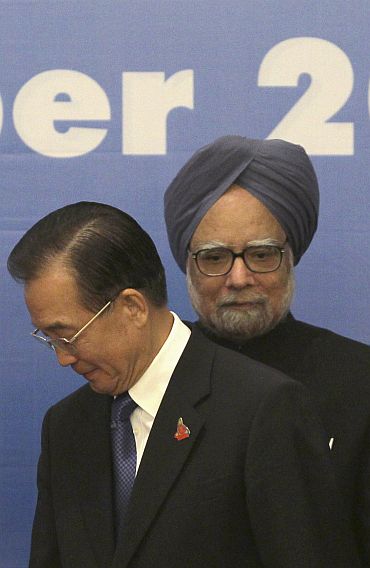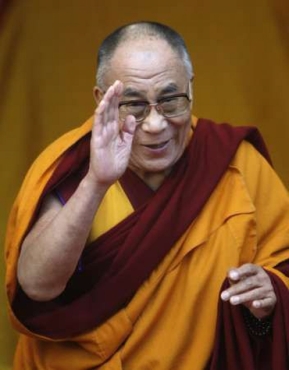 | « Back to article | Print this article |
Why China should take 'pushy' India seriously from now on
China must start taking an of late "pushy" India seriously as it has strategically placed itself in the United States-China face-off to gain maximum benefits, a leading official newspaper has said.
Days after the postponement of the 15th round of Sino-India border talks, Global Times, an influential tabloid of ruling Communist Party of China, said the talks need to be kept alive to avert a breakdown in ties.
In the first such comment from the Chinese media on the postponement of the border talks, the paper said that of late India appears to be interested in having a face-off with China and Beijing should start taking it seriously.
"The scheduled talks between China and India over border issues at the end of November were temporarily postponed," the Times said referring to deferment of talks over Beijing's objections to the Dalai Lama addressing a Buddhist conference in New Delhi.
The Chinese media has so far avoided publishing any report on the postponement of the talks that were supposed to be held in New Delhi this week between National Security Advisor Shivshankar Menon and top Chinese diplomat Dai Bingguo.
Click NEXT to read further...
'Both sides must keep the border issue from worsening'
In a surprisingly guarded editorial tiled China and India mustn't go for the throat, The Times, which in the recent past has carried write ups asserting that China should resolutely stop India-Vietnam cooperation in the South China Sea using "every possible means", struck a more conciliatory note on Tuesday, saying both countries should stop "over reacting to their disputes" to aggravate the crisis.
"While speculations about this decision (for postponement of talks) are varied, one thing is certain: India, whose GDP is a third of China's, has been maintaining a bold stance when dealing with China. Indian public opinion will not permit concessions to China, but China will not yield to India's demand on border issues either," it said.
"This is where the dilemma is. Both sides must keep the border issue from worsening by focusing on keeping goodwill talks alive and being mindful of the consequences of a sudden breakdown".
"Currently, India is a bit pushy in its relations with China. The country appears to be highly interested in facing off with China. But that contest is not the primary focus of the Chinese society," it said.
It said if India can maintain its current economic growth rate, it will only become increasingly important to China, and that India's placing itself strategically in the US-China conflict will make it difficult for Beijing to "buy it over".
Click NEXT to read further...
India's nationalist sentiment is strong
Both China and India have been feeling anxious about being "circled," it said, apparently referring to India's concerns over China making forays into its neighbourhood and China's anxieties over India developing close ties with countries like Vietnam, which are putting strong resistance to China's claims over the South China Sea.
"But their roles are different in each other's eyes. For India, China is the plotter and executor of this 'scheme' (of encirclement) whereas for China, India is a participant to this theory," the editorial said.
It, however, said that the "insecurity" from both countries is not on the same level and that India where "nationalistic sentiment" is strong has been "eagerly seeking" acknowledgement worldwide.
"It (India) claims that India is on the 'first tier' of the world even though the country is still developing. India has been eagerly seeking this acknowledgement worldwide.
Although the US has given the country a first tier diplomatic formality, the 'elephant' is not satisfied. "What it really wants is the first-tier growth rate and statistics that match China's," it said.
Click NEXT to read further...
Both countries should stop overreacting to disputes
It said China which has not taken India seriously in the past should do so from now on.
"India will not allow itself to stay quietly between the US and China. It wants to play triangle affairs with the duo, and will do anything it can to maximise its benefit out of it. Therefore, China will find it hard to buy India over. It needs to treat the South Asian country seriously," it said.
"The US has been persuading India to join its alliance against China, and issues between China and India, such as border disputes and the Dalai Lama, are difficult to solve.
Therefore, China's relation with India will face a tough road ahead. But India's ambition of becoming a strong power, as well as its economy-driven policy, will help stave off these uncertainties.
"This ensures that China's relations with India will not be the worst among neighbouring countries," it said.
"Both countries should stay calm and not take small issues to a level of strategic hostility. India's power and its development will not make it a strategic enemy to China," it said.
Both countries should avoid overreacting to their disputes, but that does not mean these issues should be hidden away. "What we need to do is not aggravate it," it said.



